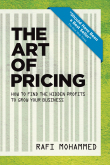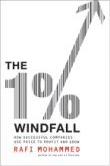Let Us Now Praise Scalpers
Reprinted from the Harvard Business Review website.
This is a big week in Boston. After a listless first week of baseball, the Red Sox return to open their season at home against the New York Yankees. That means it's also been a busy week for Boston's ticket scalpers.
If there were a list of "most despised jobs," ticket scalping would rank close to the top. But it's time to give the scalpers a break. These entrepreneurs provide a valuable service and are simply following the capitalist mantra of "buy low, sell high."
The scalping market exists for three primary reasons. First, sports teams and rock stars often keep prices low as sign of appreciation to their fans, and to generate positive brand equity. Second, these entities don't want to be accused of "taking advantage of their fans," by charging high prices, so they offer lower prices avoid negative brand equity. Finally, it's challenging to price so many tickets, particularly for sports teams with long seasons. Baseball teams have to price 40,000 tickets (bleacher to home plate seats) for each of their 81 home games. Demand varies for each game — some opponents can command higher prices. Similarly, when the Rolling Stones tour again, who knows how popular they will be and how much their draw will vary by city. (They could be hot in Hartford, tepid in Cincinnati, or vice versa.) Given this uncertainty, it's best to be conservative and set low prices. After all, no team or rock star wants to risk the embarrassment of a sea of vacant prime seats due to aggressive pricing as the Yankees experienced in 2009.
Trying to keep prices below market value is akin to hoping an inflated balloon will remain submerged in a pool of water — it's hard to do. If fans are willing to pay more, there will be a market. Moreover, scalping helps to even the playing field. Tickets often go on sale on weekdays — say, Tuesday at 10 AM. Due to work obligations, many consumers aren't able to line up, phone, or log in to purchase tickets. How fair is that? Similarly, consider that 21,500 out of the 37,000 tickets available for a Red Sox home game are reserved for season ticket holders. How fair is it that to have a good shot at going to a popular game, fans have to commit to paying for all home games?
Many states place restrictions on ticket resale. In Massachusetts, resellers have to be licensed and cannot resell tickets for more than $2 above face value or their true service costs (i.e., messengers, postage, etc.). This is absurd: what other product in the United States does the government feel compelled to get involved with regulating its resale price? Virtually any product I buy, I can resell on eBay for whatever price I choose. Some states have anti-gouging laws on prices of essential products like food and water after a disaster, which seems reasonable. But we can all agree that good seats to a Justin Bieber show hardly qualify as an "essential product," right?
If sports teams and rock stars want to ensure that low price tickets get into the hands of the right fans, they should stop complaining and do something about it. The Red Sox, for instance, have a section ("Conigliaro's Corner") where tickets must be picked up on the day of the game and buyers immediately enter the stadium. Bruce Springsteen employed a similar policy for the best tickets on past tours. Ticketmaster has ticketless technology which requires purchasers to produce government issued identification to gain entry, limiting resale opportunities. With proper effort, scalping can be curtailed.
So what should sports teams and rock stars do? Be transparent about their pricing dilemma and price like an airline does for its coach seats — vary prices based on demand. If there is a desire to sell below-market priced tickets for PR reasons, be clear about it: allot, say, 60% of tickets (including prime seats) for fans who queue up or participate in a lottery. The remaining 40% can be sold at much higher prices (or if demand is poor, discounts).
There's justification for teams and musical acts to do this, because if they don't make this service available, scalpers will. Extra profits garnered by minimizing the middlemen (scalpers) can be donated to charity or used to cross-subsidize low-priced tickets (as last minute business flyers make leisure fares possible). If teams and rock stars are scared about being so transparent, they should accept the status quo of a profit draining secondary market.
Suppose that by good fortune you purchased two $75 tickets for Opening Day at Boston's Fenway Park. Now suppose today you learn that your seats are worth $400 each. Wouldn't you be tempted to "scalp" them?




